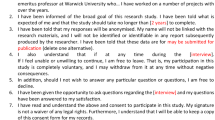Abstract
The goal of this research was to understand the various aspects of the action research initiative in the Department of Mathematics and Science, Singapore Polytechnic. A total of 55 lecturers took part in this study and data were collected through semi-structured questionnaires, informal conversations with the lecturers, observations of their behaviours in action research processes and evaluation of their action research reports. Statistical methods and grounded theory were used in the analysis. Statistical analysis showed that the lecturers generally perceive that action research is useful in teaching and learning. The core category of ‘Taking personal and professional ownership in action research’ was formed through grounded theory analysis. Through addressing the various sub-categories in the core category of ‘Taking personal and professional ownership in action research’, a number of recommendations to improve the current situation of action research implementation in the department were proposed.
Similar content being viewed by others
References
Borg S. (2002) Research in the lives of TESOL professionals. TESOL Matters 13(1): 1–5
Burns A. (2005) Action research: An evolving paradigm?. Language Teaching 38: 57–74
Calhoun E. (1994) How to use action research in the self-renewing school?. Association for Supervision and Curriculum Development, Alexandria
Carr W., Kemmis S. (1986) Becoming critical: Education, knowledge and action research. Falmer Press, London
Cochran-Smith M., Lytle S. (1990) Research on teaching and teacher research. Educational Researcher 19(2): 2–11
Cochran-Smith M., Lytle S. (1993) Inside/outside: Teacher research and knowledge. Teachers College Press, New York
Glaser B.G., Strauss A. (1967) The discovery of grounded theory. Aldine, Chicago
Goodnough K. (2008) Dealing with messiness and uncertainty in practitioner research: The nature of participatory action research. Canadian Journal of Education 31(2): 431–458
Grbich C. (1999) Qualitative research in health. Allen & Unwin, Sydney
Greenbank P. (2007) Utilising collaborative forms of educational action research: Some reflections. Journal of Further and Higher Education 31(2): 97–108
Hollingsworth S. (1996) Repositioning the teacher in US schools and society: Feminist readings of action research. In: O’Hanlon C. (Ed.) Professional development through action research in education settings. Falmer Press, London, pp 19–42
Hursh D. (1995) Developing discourses and structures to support action research for education reform. In: Noffke S., Stevenson R. (eds) Educational action research: Becoming practically critical. Teachers College Press, New York, pp 141–153
Jones J. (2004) The many benefits of a research component in English language teacher education: A ‘case study’. Prospect 19(2): 25–38
Kemmis S. (2001) Exploring the relevance of critical theory for action research: Emancipator action research in the footsteps of Jurgen Habbermas. In: Reason P., Bradbury H. (eds) Action research—participative inquiry and practice. Sage, London
Kemmis, S., McTaggart, R. (eds) (1988) The action research planner. Deakin University Press, Geelong
Rainey I. (2000) Action research and the English as a foreign language practitioner: Time to take stock. Educational Action Research 8(1): 65–91
Rearick M., Feldman A. (1999) Orientations, purposes and reflection: A framework for understanding action research. Teaching and Teacher Education 15(4): 333–349
Sardo-Brown D., Welsh L., Bolton D.L. (1995) Practical strategies for facilitating classroom teachers’ involvement in action research. Education. Chula Vista 115(4): 553
Schratz M. (1993) Crossing the disciplinary boundaries: Professional development through action research in higher education. Higher Education Research and Development 12(2): 131–142
Strauss A., Corbin J. (1998) Basics of qualitative research: Grounded theory procedures and techniques (2nd ed.). Sage, Newbury Park
Wallace M. (1991) Training foreign language teachers. Cambridge University Press, Cambridge
Wells G. (1994) Changing schools from within: Creating communities of inquiry. Heinemann, Portsmouth, NH
Whitehead J. (1993) The growth of education knowledge: Creating your own living education theory. Hyde, Bournemouth
Zuber-Skerritt O. (1993) Improving learning and teaching through action learning and action research. Higher Education Research and Development 12(1): 45–58
Author information
Authors and Affiliations
Corresponding author
Rights and permissions
About this article
Cite this article
Khiat, H., Chia, H.T., Tan-Yeoh, A.C. et al. The perspectives of lecturers on the action research journey in the Mathematics and Science Department of Singapore Polytechnic. Educ Res Policy Prac 10, 29–52 (2011). https://doi.org/10.1007/s10671-010-9092-3
Received:
Accepted:
Published:
Issue Date:
DOI: https://doi.org/10.1007/s10671-010-9092-3




